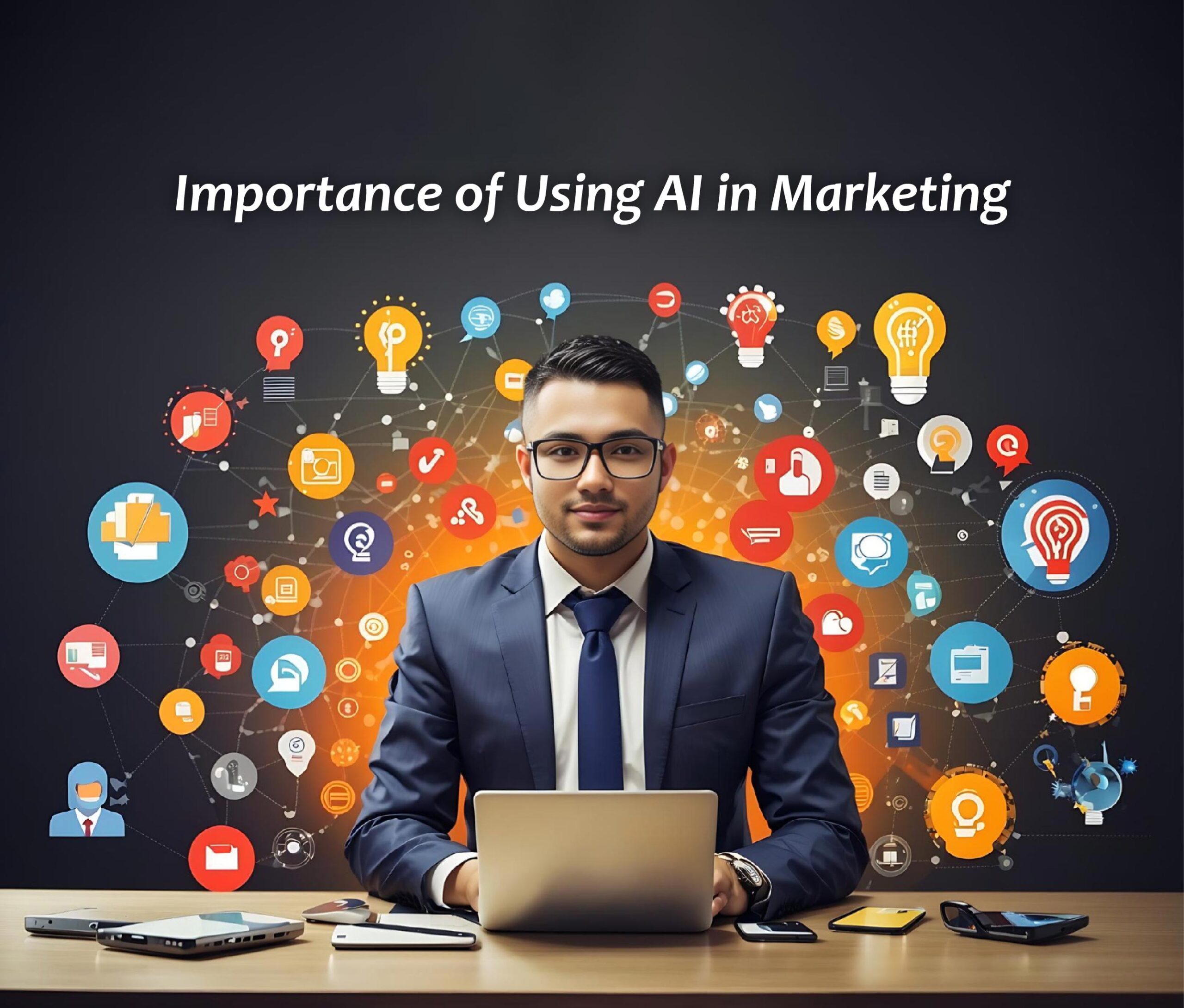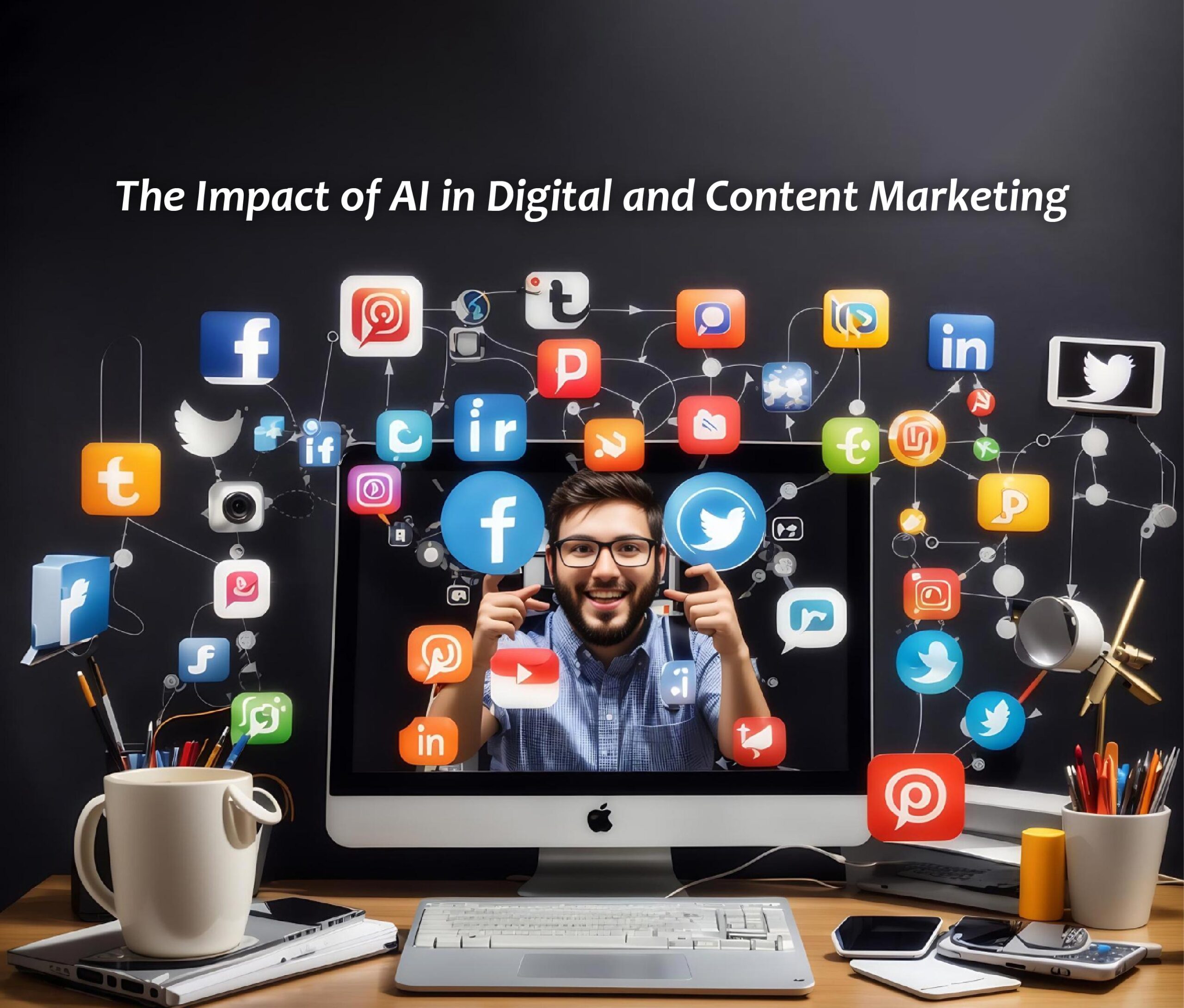Life’s all about change, right? Well, marketing’s no exception. AI marketing, thanks to cool tools like ChatGPT, is shaking things up big time. It’s not just a game-changer; it’s your secret weapon.
With AI marketing, you blend tech magic with customer vibes, getting the lowdown on your customer journey and what’s hot in the market. Natural language smarts, machine learning tricks, and sentiment vibes help you make killer decisions, keeping you ahead in the dynamic marketing game.
Let’s talk more about how AI in marketing is revolutionizing the industry as we move forward in this blog.
What is AI in Marketing?
Utilizing customer data and AI ideas like machine learning, artificial intelligence marketing (AI marketing) aims to enhance the customer journey by predicting your customers’ next actions.
Artificial intelligence developments give businesses more effective ways to accomplish it. AI has the potential to transform how businesses acquire, nurture, and convert prospects. It may also assist in creating more effective marketing strategies and enhance the customer journey.
Importance of Using AI in Marketing
 Artificial intelligence is a valuable tool for marketers that can be used in many aspects of their business. Automating extremely repetitive processes, however, is one of the main reasons organizations utilize AI marketing tools nowadays.
Artificial intelligence is a valuable tool for marketers that can be used in many aspects of their business. Automating extremely repetitive processes, however, is one of the main reasons organizations utilize AI marketing tools nowadays.
According to a recent YouGov and Salesforce survey, 53% of marketing professionals believe that generative AI will transform the game. According to survey respondents and marketers, technology helps them save roughly five hours of effort per week, or one month annually. (Consider what your marketing team could achieve if you were able to get back a full work month.)
How to Use AI in Marketing?
By 2030, marketing powered by AI is predicted to account for 45% of the world economy. It is well-positioned to achieve this through influencing customer demand, offering personalized services, and improving products through data.
AI can be applied in a variety of ways to boost marketing initiatives and increase efficacy in general. Here are a few applications of AI in marketing:
- Personalized Content: With the use of AI, personalized content that is catered to each user’s tastes and interests may be created by analyzing customer data and behavior. Personalized email marketing, dynamic website content, and tailored product suggestions are a few examples of this.
- Chatbots and Virtual Assistants: Chatbots and virtual assistants driven by AI can offer immediate customer service, respond to frequently asked queries, and help with product recommendations. They can improve their customer experience by responding promptly and accurately around the clock.
- Predictive Analytics: AI has the ability to analyze vast volumes of data to find trends, patterns, and insights that can guide marketing tactics. It can assist in lead generation, consumer behavior prediction, and campaign optimization for improved outcomes.
- Voice Search Optimization: Making marketing content voice search-friendly is essential, especially with the rise in popularity of voice assistants such as Google Assistant and Alexa from Amazon. Marketers may better align their content with voice search queries by using AI to analyze voice search trends.
- Automated Email Marketing: AI can handle email marketing tasks including audience segmentation, content personalization, and send timing optimization. Email open rates, click-through rates, and general engagement can all be raised by doing this.
- Content Generation: By analyzing data, spotting trends, and producing pertinent and interesting content, AI can help with content generation. Content curation, automated content creation, and search engine optimization are a few examples of this.
- Ad Targeting and Optimization: Digital advertising campaigns can be optimized by AI through the analysis of user behavior, demographics, and preferences. Ad performance may be enhanced, ad placements can be optimized, and advertising can be targeted to the appropriate audience.
The Impact of AI in Digital and Content Marketing
 With previously unheard-of breakthroughs in digital and content marketing, artificial intelligence (AI) is revolutionizing the marketing industry. A peek at how AI in marketing is changing these important aspects is provided here:
With previously unheard-of breakthroughs in digital and content marketing, artificial intelligence (AI) is revolutionizing the marketing industry. A peek at how AI in marketing is changing these important aspects is provided here:
AI in Digital Marketing:
AI has transformed the marketing landscape by enabling personalized targeting through in-depth analysis of consumer behavior. Marketing professionals can now craft highly tailored advertisements, ensuring a more engaging and relevant experience for their audience. Additionally, AI contributes to predictive analytics, empowering marketers to strategically plan campaigns by forecasting future trends based on historical data. The integration of chatbots, driven by AI, enhances customer interaction by providing real-time responses, ultimately boosting user satisfaction and engagement. Moreover, in the realm of digital advertising, AI plays a pivotal role in optimizing ad campaigns. Through real-time analysis of performance metrics, marketers can ensure the efficient utilization of their budgets, making AI a game-changer in maximizing the impact of digital marketing efforts.
AI in Content Marketing:
AI in marketing plays a pivotal role in various aspects of content creation and strategy, revolutionizing the landscape of marketing. It takes on the task of content creation, generating compelling and relevant content, from product descriptions to articles and social media posts. In content curation, AI algorithms sift through extensive data, tailoring personalized content recommendations for individual users, thereby enriching their content consumption experiences. SEO optimization is another area where AI tools shine, aiding marketers in fine-tuning content for search engines, ultimately boosting discoverability and expanding the reach of marketing campaigns. Furthermore, AI-driven analytics tools offer valuable insights into content performance, empowering marketers to refine their strategies in real time based on data-driven analysis. Together, these AI-powered capabilities are shaping a more efficient and impactful landscape for content marketing.
Bottom Line
The infusion of AI in marketing has undeniably transformed the landscape, revolutionizing both digital and content marketing strategies. The ability of AI to generate engaging and relevant content has not only streamlined the creative process but has also significantly enhanced user experiences. From personalized content curation that caters to individual preferences to SEO optimization that boosts discoverability, AI is at the forefront of reshaping how brands connect with their audiences.


